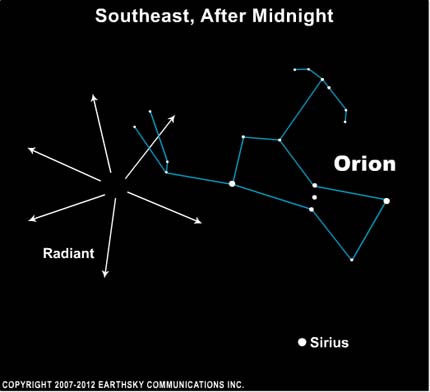A bright meteor, reportedly with hues of red and orange, streaked across the night sky visible from San Francisco’s Bay Area on Wednesday, October 17, around 8 p.m. local time (3UTC on October 18). Many say they heard a boom, which was so loud it “shook their homes,” some residents said, making them think it may be an earthquake. The meteor was bright enough to be called a fireball.
If you observed it, you might want to tell someone what you saw. Here’s a place to report your meteor sighting.
Click here for live Interactiveastronomy Skyeye Camera feeds.
The video above is raw footage from the security camera at Lick Observatory, located in the hills above San Jose, California. Camera is a little out of focus. Round structure to the left is the 40-inch Nickel refracting telescope dome. Lights in the background are the San Jose cityscape. Video posted to YouTube by Erik Kovacs.
Jonathan Braidman, astronomy instructor at Oakland’s Chabot Space and Science Center, told SuiSunCityPatch.com that the meteor may have been “roughly the size of a car when it broke up over the Bay Area.” He said hikers might be able to find small pieces of the meteorite in the hills north of Martinez, California.

Is the October 17, 2012 meteor associated with the Orionid meteor shower? That shower is coming up this weekend. Although I didn’t see it, and don’t know if its path could be traced back to the constellation Orion – which is the radiant point for all meteors in the Orionid shower – the answer is likely that the two are not associated. Meteors in annual showers are tiny, icy bits left behind by comets orbiting the sun. The Orionids, in particular, come from one of the most famous comets, Comet Halley, which last visited Earth in 1986. The meteor seen over the Bay Area on October 17, 2012 was more likely a larger, rocky meteor, just a random chunk of space debris that entered Earth’s atmosphere and vaporized due to friction with the air.
EarthSky’s meteor shower guide 2012
The October 17, 2012 meteor sighting is reminiscent of another meteor sighting earlier this year, when – on the morning of April 22, 2012 – many in Nevada and California saw a bright flash across the sky, and heard an audible boom, or explosion. The object was later called “a small asteroid” whose estimated weight was some 70 metric tons.
Read more about the April 22 meteor sighting in California and Nevada here
Astronomers use the word bolide to describe an exceptionally bright fireball such as this one. The term bolide – which comes the Greek word bolis, meaning a missile or to flash – is particularly applicable when the object is so bright it can be seen in broad daylight, when the object explodes in the atmosphere and when it creates audible sounds. In other words, all of these phenomena are known to occur, and astronomers even have a word for it.
Bright meteors or bollides were also seen in the U.K. and New Zealand in 2012. They are not uncommon, if you are considering the entire globe.
However, from any one spot on Earth, they are uncommon, Among astronomers, it’s sometimes said you might witness one bolide, or very bright fireball, in your lifetime. So if you saw this one, this was yours!
Bottom line: Many in San Francisco’s Bay Area saw an exceptionally bright meteor, and heard a loud boom, on the night of October 17, 2012. Photo and video in this post, plus information on the Orionid meteor shower, which peaks on the morning of October 21.











